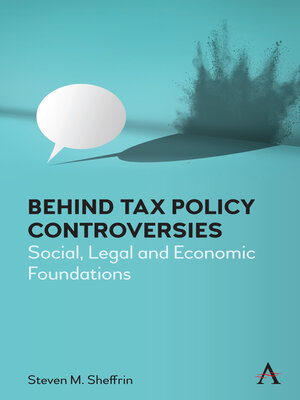Behind Tax Policy Controversies
ebook ∣ Social, Legal and Economic Foundations · Anthem Critical Introductions
By Steven Sheffrin

Sign up to save your library
With an OverDrive account, you can save your favorite libraries for at-a-glance information about availability. Find out more about OverDrive accounts.
Find this title in Libby, the library reading app by OverDrive.



Search for a digital library with this title
Title found at these libraries:
| Library Name | Distance |
|---|---|
| Loading... |
This book is designed to be a short, critical introduction to the controversies in tax policy. The main thesis of the book is that there is a deeper substructure to debates about tax policy that underlie many of the controversies. By understanding the nature of this substructure one can place the debates about tax policy into a broader perspective. The book elucidates this underlying architecture, drawing on ideas from economics, law, philosophy, psychology, and political science. It uses these tools to shed light on conventional debates on tax policy, such as whether to tax all sources of income or instead just tax consumption. It also touches on current and emerging debates. These include the appropriate goals for tax reform, the most judicious way to tax multinational corporations, our ability to tax the very wealthy, and whether the tax system has a racial subtext.
|This book is designed to be a short, critical introduction to the controversies in tax policy. The main thesis of the book is that there is a deeper substructure to debates about tax policy that underlie many of the controversies. By understanding the nature of this substructure one can place the debates about tax policy into a broader perspective. The chapters in the book elucidate this underlying architecture, drawing on ideas from economics, law, philosophy, psychology, and political science.
Economic principles shape some of the foundations for the debates, particularly with regard to the question of whether income taxes should be structured with a broad base and low rates, and whether the appropriate base of taxation should be consumption or income. Legal and administrative issues provide another foundation for tax policy, as certain structural features of the tax system—the separate existence of corporations and the realization principle for income—constrain the set of feasible tax policies. To understand tax fairness, one must delve into philosophy and psychology. A key debate is whether we view taxation just through a purely distributional lens (who gets what) or must we think about notions of process and deservingness to make sense of debates on tax fairness.
The book uses these tools to shed light on these issues as well as on the most current debates. These include the appropriate goals for tax reform, the most judicious way to tax multinational corporations, our ability to tax the very wealthy, and whether the tax system has a racial subtext.







